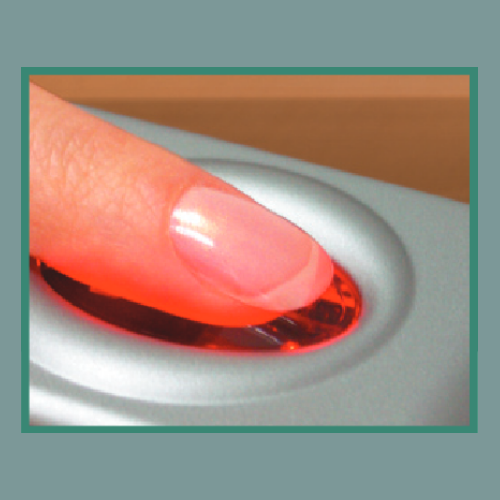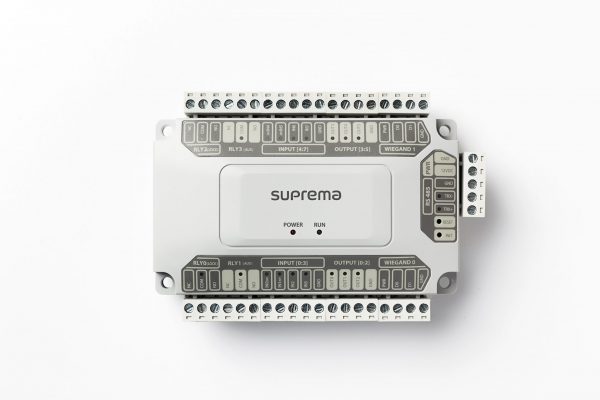Fingerprint identification for stand-alone or client-server solutions
The identification of people based on Touch is based on the uniqueness of fingerprints that leave human fingertips when they come into contact with a surface. That’s why fingerprints can be considered safe as a kind of signature, which accurately certifies the identity of a person.
- Description
- SOFTWARE
- Specifications
- Brochure
Description
Operating principle
The identification procedure is done in two stages:
» It is initially necessary to digitize a fingerprint footprint through a scanner/touch reader, either directly from a fingertip or a photo or from the so-called “latent fingerprint” directly from the scene of the crime or investigation.
» Then the identification is achieved by using a composite algorithm (mathematical equation), which compares specific features of the digitized fingerprint footprint with the corresponding special traits of the fingerprints Images are kept in a database.
Applications
» Criminology-Identification of perpetrators
» Recording of company staff working time
» Access Control in physical areas
» Search engines that recognize objects from photos
» Security of software Use-user identification
» Internet Applications (e-commerce, electronic banking, etc.)
VeriFinger SDK is based on VeriFinger fingerprint recognition technology and is intended for biometric systems developers and integrators. The SDK allows rapid development of biometric applications using functionality from the VeriFinger algorithm for Microsoft Windows, Linux, macOS, iOS and Android. VeriFinger can be easily integrated into the customer’s security system. The integrator has complete control over SDK data input and output.
VeriFinger SDK includes the Device Manager library for working with the supported fingerprint readers. Integrators can also write plug-ins to support their fingerprint readers or other devices using the plug-in framework provided with the Device Manager.
The following VeriFinger 13.0 SDKs are available:
- VeriFinger 13.0 Standard SDK is designed for PC-based, embedded and mobile biometric application development. It includes Fingerprint Matcher and Extractor component licenses, programming samples and tutorials, fi ngerprint scanner support modules and software documentation. The SDK allows the development of biometric applications for Microsoft Windows, Linux, macOS, iOS and Android operating systems.
- VeriFinger 13.0 Extended SDK is designed for biometric client-server application development. It contains all features and components of the Standard SDK. Additionally, the SDK includes Fingerprint Client component licenses for PCs and mobile devices, sample client applications, tutorials and a ready-to-use matching server component.
There are specific requirements for each platform which will run VeriFinger-based applications.
Microsoft Windows platform requirements
- Microsoft Windows 7 / 8 / 10 / 11.
- PC or laptop with x86-64 (64-bit) compatible processors.
- 2 GHz or better processor is recommended.
- AVX2 support is highly recommended. Processors that do not support AVX2 will still run the VeriFinger algorithms, but in a mode, which will not provide the specified performance. Most modern processors support this instruction set, but please check if a particular processor model supports it.
- The CPU plugin supports inference on Intel Xeon with Intel AVX2 and AVX-512, Intel Core processors with Intel AVX2, Intel Atom Processors with Intel SSE.
- 2 GB of free RAM is recommended for general usage scenarios. It is possible to reduce RAM usage for particular scenarios. Also, additional RAM may be required for applications that perform 1-to-many identification, as all biometric templates need to be stored in RAM for matching.
- Fingerprint reader. VeriFinger SDK includes support modules for more than 120 fingerprint scanners under Microsoft Windows platform. Integrators can also write plug-ins to support their fingerprint readers using the plug-in framework provided with the Device Manager from the VeriFinger SDK.
- Database engine or connection with it. VeriFinger templates can be saved into any DB (including files) supporting binary data saving. VeriFinger Extended SDK contains the following support modules for Matching Server on Microsoft Windows platform:
- Microsoft SQL Server;
- MySQL;
- Oracle;
- PostgreSQL;
- SQLite.
- Network/LAN connection (TCP/IP) for client/server applications. Also, network connection is required for using Matching server component (included in VeriFinger Extended SDK). VeriFinger SDK does not provide communication encryption with the Matching server, therefore, integrators should secure the communication by themselves.
- Microsoft .NET framework 4.5 or newer (for .NET components usage).
- One of following development environments for application development:
- Microsoft Visual Studio 2012 or newer (for application development under C/C++, C#, Visual Basic .Net)
- Java SE JDK 8 or newer
- Python 3.x
Android platform requirements
- A smartphone or tablet that is running Android 5.0 (API level 21) OS or newer.
- If you have a custom Android-based device or development board, contact us to find out if it is supported.
- ARM-based 1.5 GHz processor recommended for fingerprint processing in the specified time. Slower processors may be also used, but the fingerprint processing will take longer time.
- At least 1 GB of free RAM should be available for the application. Additional RAM is required for applications that perform 1-to-many identification, as all biometric templates need to be stored in RAM for matching.
- Fingerprint reader. VeriFinger SDK includes support modules for a number of fingerprint scanners under Android platform. Integrators can also write plug-ins to support their fingerprint readers using the plug-in framework provided with the Device Manager from the VeriFinger SDK.
- Network/LAN connection (TCP/IP) for client/server applications. Also, network connection is required for using Matching server component (included in VeriFinger Extended SDK). VeriFinger SDK does not provide communication encryption with the Matching server, therefore, integrators should secure the communication by themselves.
- PC-side development environment requirements:
- Java SE JDK 8 (or higher)
- AndroidStudio 4.0 IDE
- AndroidSDK 21+ API level
- Gradle 6.8.2 build automation system or newer
- Android Gradle Plugin 4.1.2
- Internet connection for activating VerFinger component licenses
iOS platform requirements
- One of the following devices, running iOS 11.0 or newer:
- iPhone 5S or newer iPhone.
- iPad Air or newer iPad models.
- At least 1 GB of free RAM should be available for the application. Additional RAM is required for applications that perform 1-to-many identification, as all biometric templates need to be stored in RAM for matching.
- Fingerprint reader. VeriFinger SDK includes support modules for several fingerprint scanners under iOS platform. Also, fingerprint images in BMP, JPG, PNG or WebP formats can be processed thus almost any third-party fingerprint capturing hardware can be used with the VeriFinger technology if it generates images in the mentioned formats.
- Network/LAN connection (TCP/IP) for client/server applications. Also, network connection is required for using Matching server component (included in VeriFinger Extended SDK). Communication with Matching server is not encrypted, therefore, if communication must be secured, a dedicated network (not accessible outside the system) or a secured network (such as VPN; VPN must be configured using operating system or third party tools) is recommended.
- Development environment requirements:
- a Mac running macOS 10.13 or newer.
- Xcode 9.3 or newer.
macOS platform requirements
- A Mac running macOS 10.13 or newer.
- 2 GHz or better processor is recommended.
- x86-64 (Intel) and ARM (Apple M1 family) processor architectures supported.
- 2 GB of free RAM is recommended for general usage scenarios. It is possible to reduce RAM usage for particular scenarios. Also, additional RAM may be required for applications that perform 1-to-many identification, as all biometric templates need to be stored in RAM for matching.
- Fingerprint reader. VeriFinger SDK includes support modules for a number of fingerprint scanners under macOS platform. Integrators can also write plug-ins to support their fingerprint readers using the plug-in framework provided with the Device Manager from the VeriFinger SDK.
- Database engine or connection with it. VeriFinger templates can be saved into any DB (including files) supporting binary data saving. VeriFinger Extended SDK contains SQLite support modules for Matching Server on macOS platform.
- Network/LAN connection (TCP/IP) for client/server applications. Also, network connection is required for using Matching server component (included in VeriFinger Extended SDK). VeriFinger SDK does not provide communication encryption with the Matching server, therefore, integrators should secure the communication by themselves.
- Specific requirements for application development:
- XCode 9.3 or newer
- GNU Make 3.81 or newer (to build samples and tutorials development)
- Java SE JDK 8 or newer
Linux x86-64 platform requirements
- Linux 4.9 kernel or newer is required.
- PC or laptop with x86-64 (64-bit) compatible processors.
- 2 GHz or better processor is recommended.
- AVX2 support is highly recommended. Processors that do not support AVX2 will still run the VeriFinger algorithms, but in a mode, which will not provide the specified performance. Most modern processors support this instruction set, but please check if a particular processor model supports it.
- The CPU plugin supports inference on Intel Xeon with Intel AVX2 and AVX-512, Intel Core processors with Intel AVX2, Intel Atom Processors with Intel SSE.
- 2 GB of free RAM is recommended for general usage scenarios. It is possible to reduce RAM usage for particular scenarios. Also, additional RAM may be required for applications that perform 1-to-many identification, as all biometric templates need to be stored in RAM for matching.
- Fingerprint reader. VeriFinger SDK includes support modules for a number of fingerprint scanners under Linux x86-64 platform. Integrators can also write plug-ins to support their fingerprint readers using the plug-in framework provided with the Device Manager from the VeriFinger SDK.
- glibc 2.24 library or newer
- Database engine or connection with it. VeriFinger templates can be saved into any DB (including files) supporting binary data saving. VeriFinger Extended SDK contains the following support modules for Matching Server on Linux platform:
- MySQL;
- Oracle;
- PostgreSQL;
- SQLite.
- Network/LAN connection (TCP/IP) for client/server applications. Also, network connection is required for using Matching server component (included in VeriFinger Extended SDK). VeriFinger SDK does not provide communication encryption with the Matching server, therefore, integrators should secure the communication by themselves.
- Specific requirements for application development:
- gcc 6.3 or newer
- GNU Make 3.81 or newer
- Java SE JDK 8 or newer
- Python 3.x
Linux ARM64 platform requirements
We recommend to contact us and report the specifications of a target device to find out if it will be suitable for running VeriFinger-based applications.
There is a list of common requirements for ARM Linux platform:
- A device with ARM-based processor, running Linux 3.2 kernel or newer.
- ARM-based 1.5 GHz processor recommended for fingerprint processing in the specified time.
- ARMHF architecture (EABI 32-bit hard-float ARMv7) is required.
- Lower clock-rate processors may be also used, but the fingerprint processing will take longer time.
- At least 1 GB of free RAM should be available for the application. Additional RAM is required for applications that perform 1-to-many identification, as all biometric templates need to be stored in RAM for matching.
- Fingerprint reader. VeriFinger SDK includes support modules for several fingerprint scanners under ARM Linux platform. Also, fingerprint images in BMP, JPG, PNG or WebP formats can be processed thus almost any third-party fingerprint capturing hardware can be used with the VeriFinger technology if it generates images in the mentioned formats.
- glibc 2.17 or newer.
- Network/LAN connection (TCP/IP) for client/server applications. Also, network connection is required for using Matching server component (included in VeriFinger Extended SDK). VeriFinger SDK does not provide communication encryption with the Matching server, therefore, integrators should secure the communication by themselves.
- Development environment specific requirements:
- gcc 4.8 or newer
- GNU Make 3.81 or newer
- Java SE JDK 8 or newer





